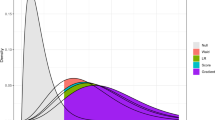Abstract
Warm (in Psychometrika, 54, 427–450, 1989) established the equivalence between the so-called Jeffreys modal and the weighted likelihood estimators of proficiency level with some dichotomous item response models. The purpose of this note is to extend this result to polytomous item response models. First, a general condition is derived to ensure the perfect equivalence between these two estimators. Second, it is shown that this condition is fulfilled by two broad classes of polytomous models including, among others, the partial credit, rating scale, graded response, and nominal response models.
Similar content being viewed by others
References
Andrich, D. (1978). A rating formulation for ordered response categories. Psychometrika, 43, 561–573. doi:10.1007/BF02293814.
Bock, R.D. (1972). Estimating item parameters and latent ability when responses are scored in two or more nominal categories. Psychometrika, 37, 29–51. doi:10.1007/BF02291411.
Embretson, S.E., & Reise, S.P. (2000). Item response theory for psychologists. Mahwah: Lawrence Erlbaum Associates.
Jeffreys, H. (1946). An invariant form for the prior probability in estimation problems. Proceedings of the Royal Society of London. Series A, Mathematical and Physical Sciences, 186, 453–461.
Magis, D., & Raîche, G. (2012). On the relationships between Jeffreys modal and weighted likelihood estimation of ability under logistic IRT models. Psychometrika, 77, 163–169. doi:10.1007/s11336-011-9233-5.
Masters, G.N. (1982). A Rasch model for partial credit scoring. Psychometrika, 47, 149–174. doi:10.1007/BF02296272.
Muraki, E. (1990). Fitting a polytomous item response model to Likert-type data. Applied Psychological Measurement, 14, 59–71. doi:10.1177/014662169001400106.
Muraki, E. (1992). A generalized partial credit model: application of an EM algorithm. Applied Psychological Measurement, 16, 159–176. doi:10.1177/014662169201600206.
Samejima, F. (1969). Estimation of latent ability using a response pattern of graded scores. Psychometrika monograph (Vol. 17).
Samejima, F. (1998, April). Expansion of Warm’s weighted likelihood estimator of ability for the three-parameter logistic model to general discrete responses. Paper presented at the annual meeting of the National Council on Measurement in Education, San Diego, CA.
Thissen, D., & Steinberg, L. (1986). A taxonomy of item response models. Psychometrika, 51, 567–577. doi:10.1007/BF02295596.
Warm, T.A. (1989). Weighted likelihood estimation of ability in item response models. Psychometrika, 54, 427–450. doi:10.1007/BF02294627.
Acknowledgements
The author wishes to thank Roger E. Millsap, Editor, and three anonymous reviewers for their helpful comments. This research was funded by a post-doctoral research grant “Chargé de recherches” of the National Funds for Scientific Research (FNRS, Belgium), the IAP Research Network P7/06 of the Belgian State (Belgian Science Policy), and the Research Funds of the KU Leuven, Belgium.
Author information
Authors and Affiliations
Corresponding author
Rights and permissions
About this article
Cite this article
Magis, D. A Note on Weighted Likelihood and Jeffreys Modal Estimation of Proficiency Levels in Polytomous Item Response Models. Psychometrika 80, 200–204 (2015). https://doi.org/10.1007/s11336-013-9378-5
Received:
Published:
Issue Date:
DOI: https://doi.org/10.1007/s11336-013-9378-5




